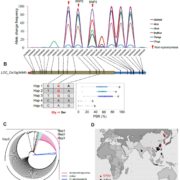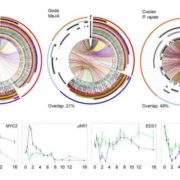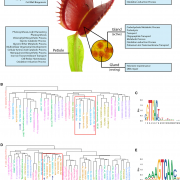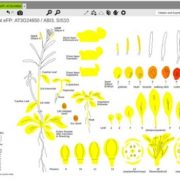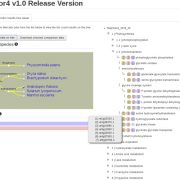Genes responsible for deceleration of circadian rhythms during tomato domestication (PNAS)
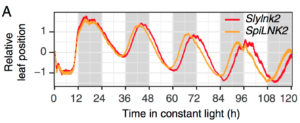 Domestication of crop plants is intimately linked to the modulation of the plants circadian rhythms, allowing adaptation to new agricultural environments. Deceleration of the clock has been instrumental in tomato domestication; however the underlying molecular mechanisms are not fully understood. In this study, Müller et al. identify a mutated allele of LNK2, together with the previously described mutation in EID1, as the main cause for the delayed circadian rhythm in cultivated tomato. Using a combination of evolutionary genomics and quantitative genetics, they show that both mutations appeared early during tomato domestication and have been fixed in the modern cultivated tomatoes. They further show that the clock deceleration by LNK2 and EID1 is light-conditional and requires a functional photoreceptor gene PHYB1. Together, this study sheds light on the molecular mechanisms associated with tomato adaptation to higher latitudes during domestication, and suggests that circadian clocks and light-signaling pathways could be engineered to obtain highly adaptable crop plants. (Summary by Matthias Benoit) Proc. Natl. Acad. Sci. USA 10.1073/pnas.1801862115
Domestication of crop plants is intimately linked to the modulation of the plants circadian rhythms, allowing adaptation to new agricultural environments. Deceleration of the clock has been instrumental in tomato domestication; however the underlying molecular mechanisms are not fully understood. In this study, Müller et al. identify a mutated allele of LNK2, together with the previously described mutation in EID1, as the main cause for the delayed circadian rhythm in cultivated tomato. Using a combination of evolutionary genomics and quantitative genetics, they show that both mutations appeared early during tomato domestication and have been fixed in the modern cultivated tomatoes. They further show that the clock deceleration by LNK2 and EID1 is light-conditional and requires a functional photoreceptor gene PHYB1. Together, this study sheds light on the molecular mechanisms associated with tomato adaptation to higher latitudes during domestication, and suggests that circadian clocks and light-signaling pathways could be engineered to obtain highly adaptable crop plants. (Summary by Matthias Benoit) Proc. Natl. Acad. Sci. USA 10.1073/pnas.1801862115



